'Reckoning:' Racial justice, equity issues take center stage in Indy mayor's race
- Oops!Something went wrong.Please try again later.
- Oops!Something went wrong.Please try again later.
At Christ Temple Apostolic Faith Assembly in Fall Creek on April 20 in front of a largely Black audience, four of Indianapolis’ mayoral candidates were asked, “What is your relationship with the Black community?”
The encounter highlights how in the first mayoral election after the nationwide racial justice protests of 2020, which included protests in Indianapolis, race issues have featured prominently. The eight remaining candidates, four of whom are Black and who form the most diverse pool the city has seen this century, have been pressed on how they'd address racial inequity and the Black community.
Adding to the pressure, Indianapolis, a city of which 29% is Black, has only ever had white men serve as mayors. No person of color or woman has ever been elected to helm the city. Many political watchers once thought this would be the election where that changed, but Mayor Joe Hogsett upended the political landscape when he announced he would seek a third term to complete what he feels is unfinished business due to the COVID-19 pandemic.
More: Systemic bias has kept African Americans and women from the highest offices in Indiana
Hogsett, who is white, has touted his cabinet as the most diverse in city history. His primary challenger, state Rep. Robin Shackleford, D-Indianapolis, who is Black, has made diversity, equity and inclusion a key part of her platform.
One of the Republican frontrunners, Jefferson Shreve, who is white, has been pressured to defend whether he had a diverse hiring track record in his company, Storage Express, which he sold for $590 million last year, and on his relationship with the Black community. The other frontrunner, Abdul-Hakim Shabazz, who is Black, has had to defend his own ideas and track record of making controversial comments about race issues.
And a third Republican candidate, the Rev. James Jackson, who is Black, has spoken about how hard it is to be a Black Republican as he advocates for more diversity in the GOP.
Three other candidates, Democrats Bob Kern and Larry Vaughn, and Republican John Couch, raised little to no money for their campaigns.
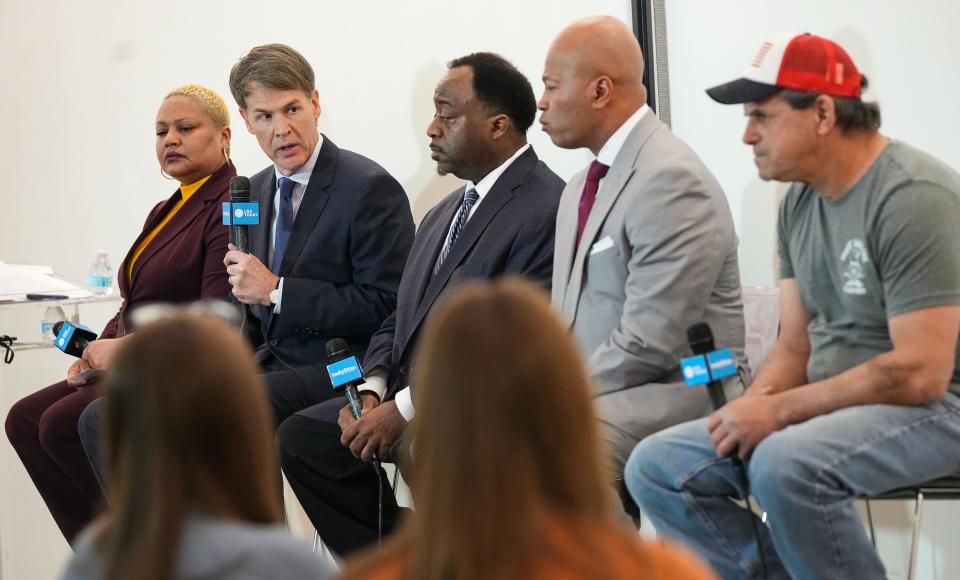
Beyond what the candidates' official political campaigns are saying, Indianapolis voters told IndyStar they're paying more attention to how their politicians handle racial disparities.
“With this kind of reckoning we had in 2020 not only as a city, but also as a country, (race issues) are on the forefront not only of politicians’ minds but also citizens’ minds,” Sampson Levingston, an Indianapolis history expert who leads tours of the city that focus on Black history through his organization Through2Eyes, said.
Many said it's long overdue.
“Black grassroots have had a hard time with the Democratic leadership here,” Black community activist Wildstyle Paschall said.
What Shackleford and Hogsett say about racial inequity
Indianapolis is part of national trend of a rise in candidates of color, especially women, in mayoral elections, Vanessa Cruz Nichols, an expert in race and political science at Indiana University Bloomington, said.
The representation voters get from diverse candidates is not just symbolic, experts said, but substantively impacts the kinds of policies and priorities brought to the fore.
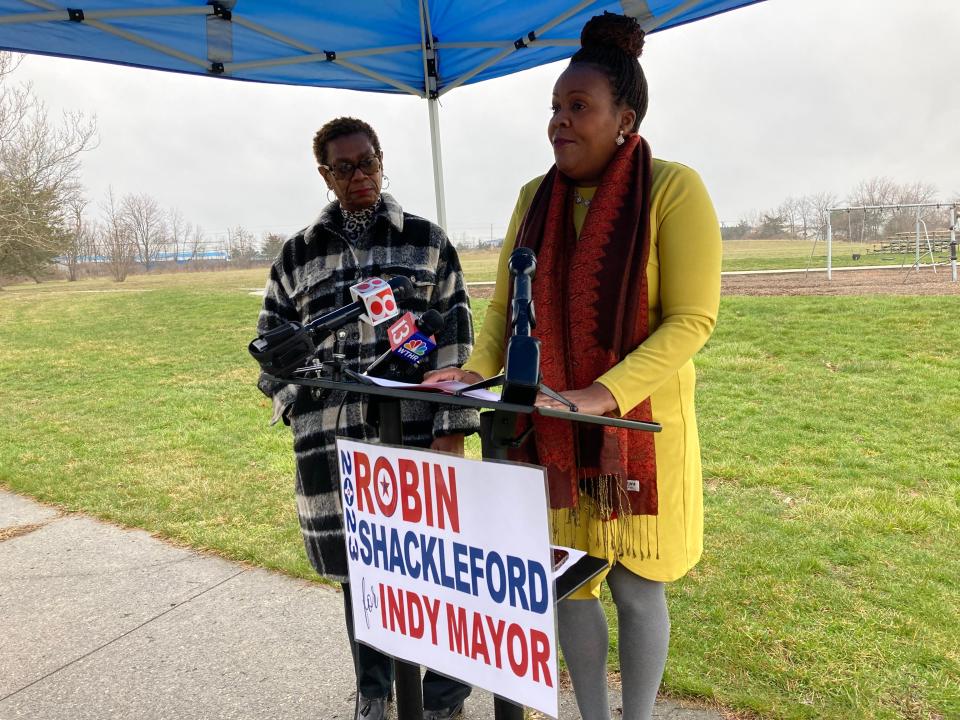
Cruz Nichols called Shackleford’s candidacy a huge deal for the city, and said it’s noteworthy that a Black Democrat, Gregory Meriweather, ended his mayoral campaign to back her.
Politicos and voters have called Shackleford the strongest Black mayoral candidate the city has had at least since Z. Mae Jimison, a Democratic judge, became the first and only Black leader in the city's history to win a major party primary for mayor in 1995. Jimison lost the general election to incumbent Republican Steven Goldsmith.
In her bid for mayor, Shackleford has highlighted proposals to recruit more police officers of color, and to address racial health care disparities. She also wants to launch an expansive equity plan that includes appointing a diversity advocate for each city department, prioritizing minority hiring for city government, and developing a transparency portal where all citizens can access contracts and grant opportunities given out by the city.
Shackleford has leaned into the fact she would become the city’s first Black mayor, if elected, calling it long overdue. She announced her run for mayor at the historic Madam CJ Walker Legacy Center, putting herself firmly in the lineage of Indianapolis’ Black women leaders.
That strategy could be advantageous for her.
Cruz Nichols cited research that shows Black women mayors across the country earned electoral victories without shying away from discussing their racial and gender identity.
“Especially with minority female candidates, it’s a strength and they have an advantage in moving into their identities, how they grew up, as opposed to white washing some of their rhetoric,” she said.
More: Hogsett faces 'real competition' in Shackleford as Indianapolis mayoral primaries heat up
Hogsett’s official campaign platform on his website does not explicitly mention racial justice issues, but during this election cycle, he has promoted the fact that his administration has the most diverse cabinet in city history, featuring three women deputy mayors, as well as multiple leaders of color in executive positions like police chief, fire chief, the director of Indy Parks.
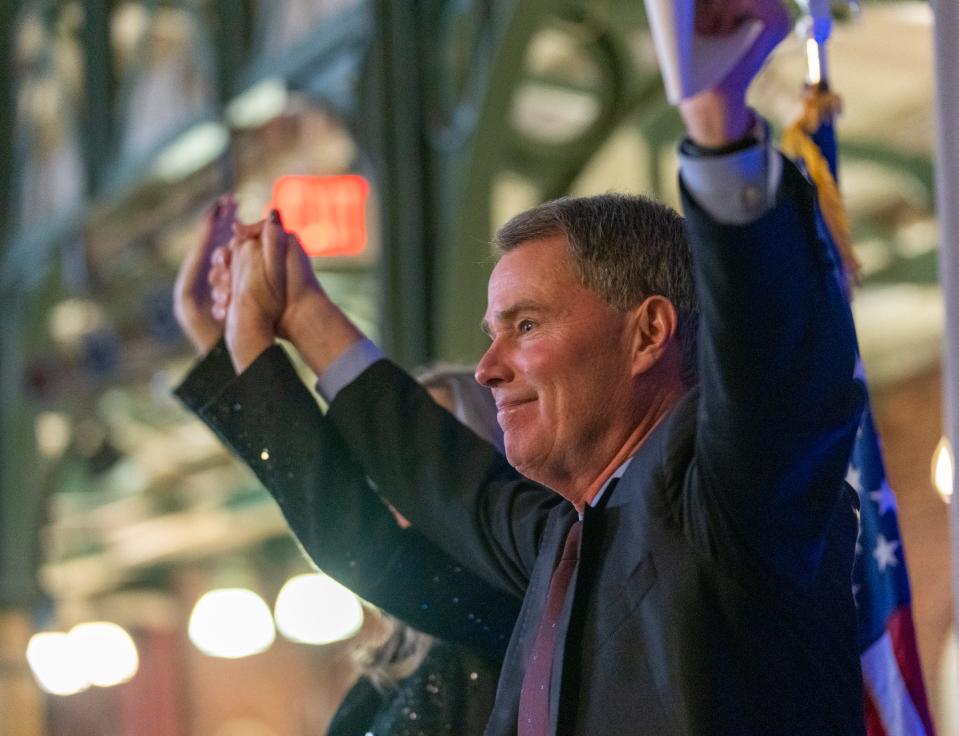
His administration also commissioned the first study examining racial and gender disparities in city-awarded contracts in more than 20 years, his campaign spokesperson Hannah Thomas said, and focuses on addressing the root causes of inequity, like education and economic opportunity.
He has also touted the fact his administration created the city’s first chief diversity and equity officer in December 2022.
Candidates pressured to defend record on race issues
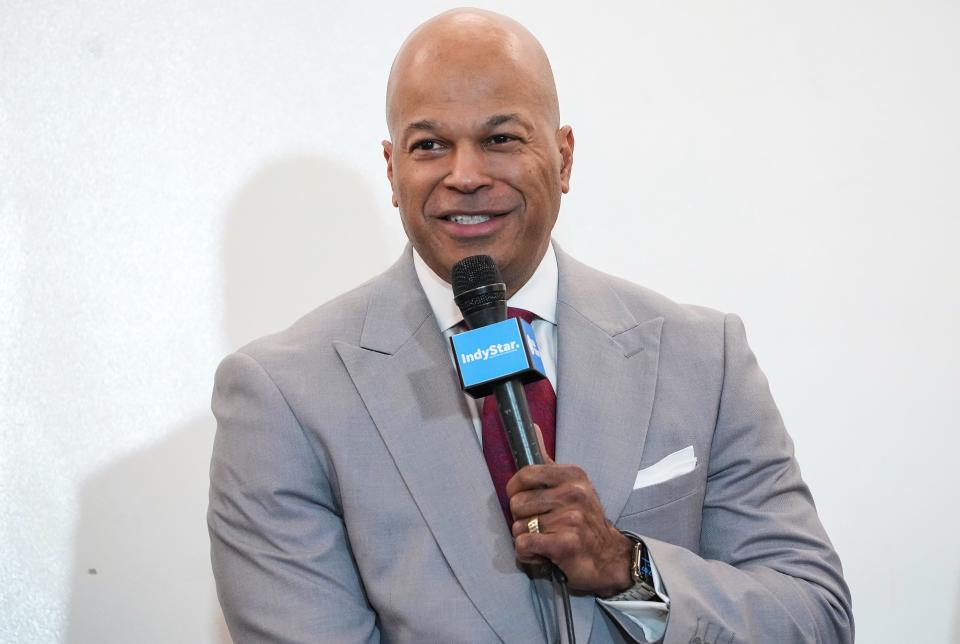
Candidates have been under heightened scrutiny for their track record on race issues during this election.
In front of a largely Black audience at Christ Temple Apostolic Faith Assembly in Fall Creek on April 20, the four candidates who attended, Shreve, Shabazz, Shackleford and Jackson, were asked what their relationships with the Black community were like. Hogsett wasn't in attendance and hasn't been at mayoral candidate town halls this election cycle apart from one hosted by IndyStar.
Jackson and Shackleford pointed to their long-time service within the Black community, Jackson as a pastor at Fervent Prayer Church on the far eastside, and Shackleford as the representative of an overwhelmingly Black Indiana legislative district and resident of the far eastside.
Shreve said: “I acknowledge I’m a middle-aged white guy, born in Perry Township. A lot of people might not assume that about me but I went to IPS schools with a lot of Black kids. And I just didn’t really think about it.
“Take me for what I am. It isn’t a big deal. It’s not something as a lens I’m thinking of when I’m working with people in our city.”
The Marion County Democratic Party and residents have attacked both Republican frontrunners, Shreve and Shabazz, on racial equity.
Cruz Nichols said that research shows such attacks tend to resonate with Black voters and white liberals but don't tend to affect the moderate and conservative voter base of Republican candidates.
More: What to know about Republican candidates for Indianapolis mayor
Shreve came under fire from Democrats and on social media for a comment he made in an interview with Adam Wren, an Indianapolis journalist, for the Importantville newsletter. In it, Shreve said he did not have any Black people in his senior leadership team at Storage Express.
The Marion County Democrats were quick to attack, sending out a news release saying that Shreve cannot being trusted to lead Indiana’s most diverse city.
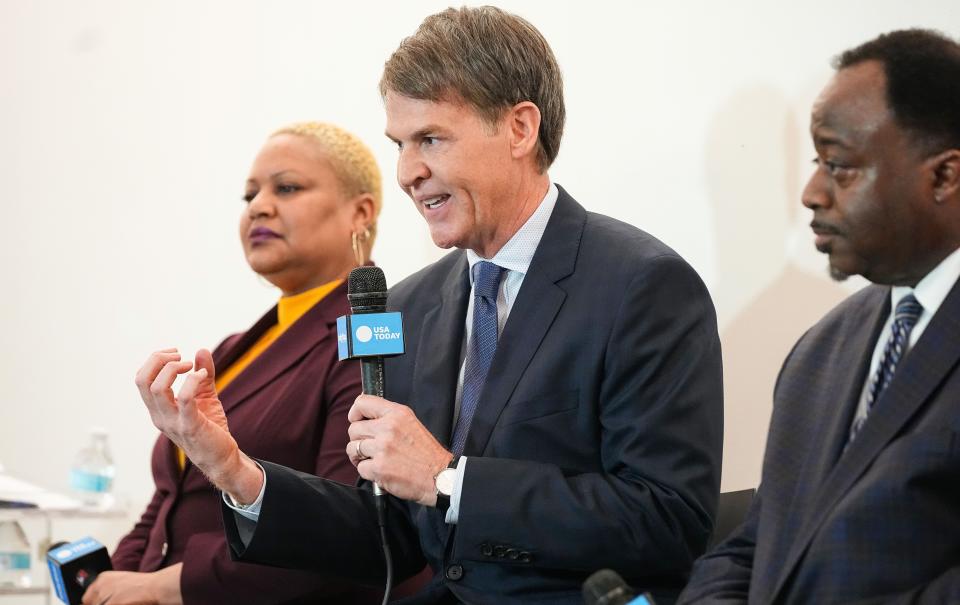
Shreve’s campaign spokesperson, Jennifer Erbacher, responded to what she called the Democrats' unfounded allegations by stating that Shreve was referring to a four-person senior leadership team. Erbacher added that he had promoted many other Black employees as president of Storage Express.
"Jefferson Shreve will be the mayor for all residents of Indianapolis," the statement read.
At the town hall, Shreve also was asked by Bishop Derek Jefferson, president of the Interdenominational Ministerial Alliance of Greater Indianapolis, “Why is it on all the beautiful commercials you have, African Americans are nowhere around?”
“That’s true, and I apologize,” Shreve responded.
Meanwhile, Democrats and Black residents have criticized Shabazz for his past inflammatory comments and his proposals around crime that they said harm the Black community.
Shabazz's controversial comments have run the gamut from a 2014 tweet about what he called "homeycides" in which he stated not everyone is worth saving to a 2015 Indianapolis Recorder column in which he said Indianapolis' high homicide rates were a “self-cleaning oven” to the idea of having tougher penalties for crimes committed in low-income areas.
He's stood by them, stating that they challenge people to think.
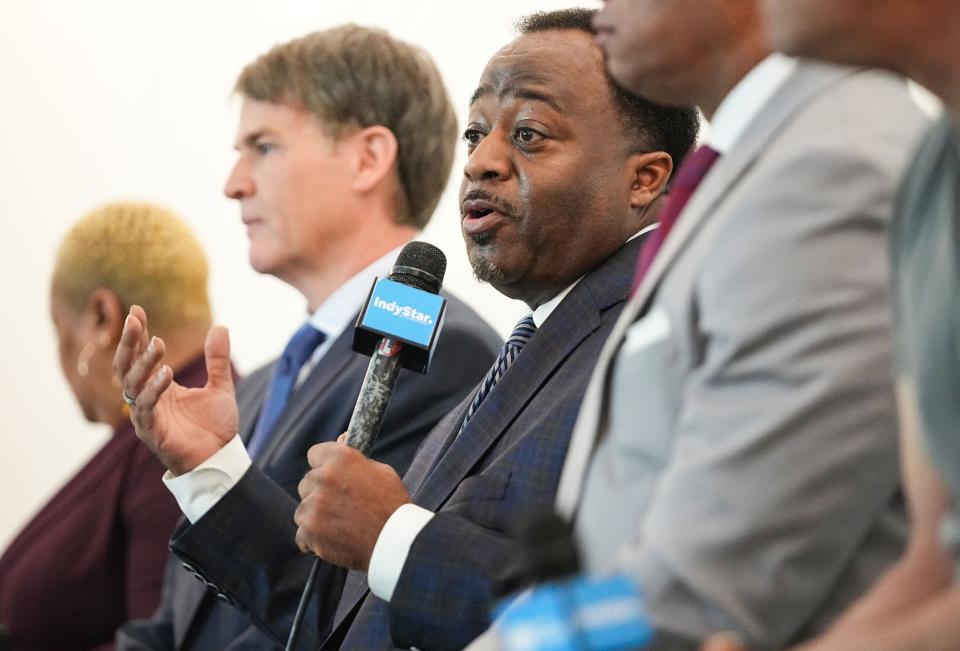
Shabazz told IndyStar racism exists in America, but he believes in individual self-help as a way to address it. When it comes to policy-making, he said he supports an approach that is regardless of race.
“Granted, African-Americans, people of color, have different issues, but at end of day, we all want the same thing: to live in a crime-free neighborhood, good roads, good schools and economic opportunity,” he said at the town hall.
He’d tackle racial inequality, he said, by supporting Black-owned businesses as mayor.
May 2 primary
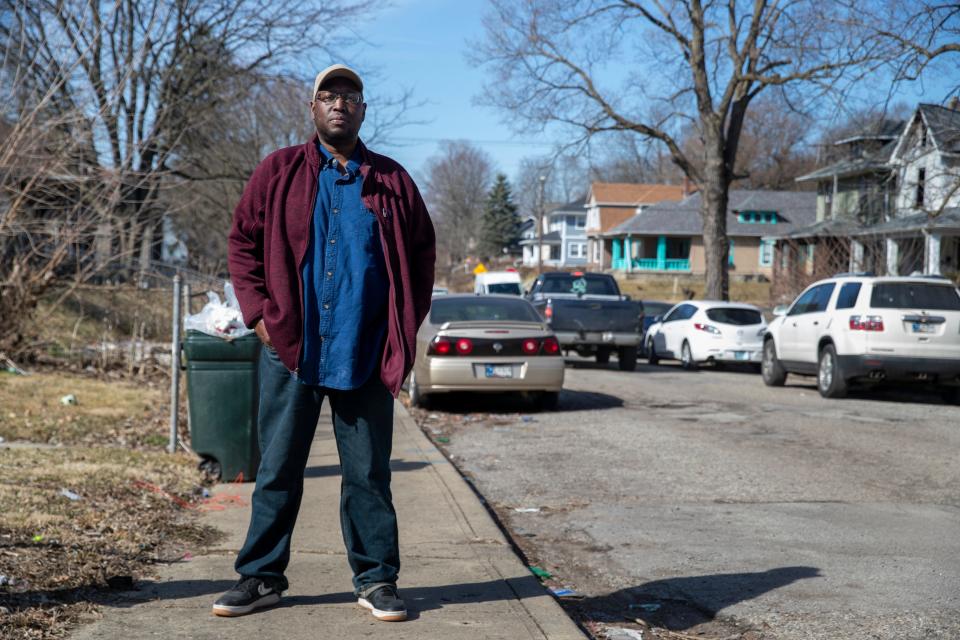
Whether the party nominees end up being a Black politician or not, Paschall, the community activist, said it shouldn’t be viewed as a setback if a Black candidate doesn’t win.
“It shows the status quo in this city that have been running this city for 100 years — white men —that Black people do exist," Paschall said, "and do want to see change in their community."
The primary is May 2. Early voting has begun.
Contact IndyStar reporter Ko Lyn Cheang at kcheang@indystar.com or 317-903-7071. Follow her on Twitter: @kolyn_cheang.
This article originally appeared on Indianapolis Star: Racial justice, equity issues take center stage in Indy mayor's race

